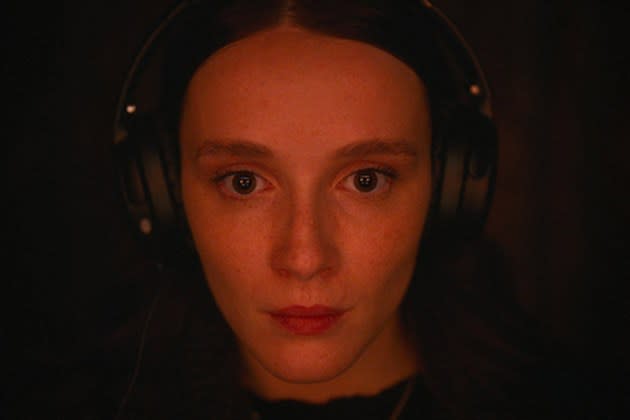‘Red Rooms’ Review: Icily Effective Chiller Makes the Murderer Less Scary Than His Groupies
- Oops!Something went wrong.Please try again later.

A central character in Pascal Plante’s disturbing thriller is a mousy-looking man, the sort of anonymous figure you wouldn’t give a second look, on trial for the brutal murders of three teenage girls, which he broadcast live on the dark web. And he’s not even the scariest person onscreen in Red Rooms (Les Chambres rouges).
That would be Kelly-Anne, played to chillingly icy perfection by Juliette Gariépy. For reasons never explained in the film — showcased at the Karlovy Vary International Film Festival — successful fashion model Kelly-Anne has become obsessed with Ludovic Chevalier (Maxwell McCabe-Lokos, personifying the banality of evil), whose case is being heard in a Montreal courtroom.
More from The Hollywood Reporter
Celine Song on How Making 'Past Lives' Led Her to Fall "So Hard in Love With Filmmaking"
The Philippines Threatens to Join Vietnam in Banning 'Barbie'
Although the killer is masked in two of the snuff videos (the third has gone unfound), there’s a preponderance of evidence against Chevalier, who sits alone in a booth like a modern-day Adolf Eichmann. He’s all the more terrifying for his impassive demeanor, looking as if he’s vaguely bored by the proceedings.
Kelly-Anne shows up at the courtroom every day, presumably in support of Chevalier, dubbed by the media the “Demon of Rosemont,” although the model never expresses her feelings one way or the other to anyone.
That’s in sharp contrast to her fellow serial killer groupie, the teenage Clementine (Laurie Babin), who insists on Chevalier’s innocence and loudly proclaims her indignation over his being railroaded to anyone who’ll listen. As the trial progresses with its horribly graphic content, a victim’s mother declares her disgust to Chevalier’s unlikely supporters: “You’re spitting on our daughter’s grave.”
United by their shared interest, the two women form a bond. Kelly-Anne invites the obviously homeless Clementine to crash at her place, a sterile apartment in a modern high-rise building featuring terrific views and the constant sound of whistling wind. Kelly-Anne reveals herself to be a technological whiz, her life managed by a custom-designed A.I. named “Guinevere,” which responds to every voice command, even telling not-so-bad jokes when requested.
Although seriously misguided in her convictions, the immature Clementine at least shows signs of humanity, breaking down in hysterics after she calls into a tabloid television talk show and is swiftly humiliated by the host. Kelly-Anne, on the other hand, is as dispassionate as her A.I. assistant, only revealing her internal strife when she pushes herself to the point of exhaustion in a workout. It’s a quality that serves her well in her profession, in which she comes across like a gorgeous blank mannequin. The same goes for her side gig playing online poker, where her absence of emotion makes her a consistent winner.
Tapping into the bizarre trend of women becoming enamored with serial killers that has only grown more prevalent in modern times, the film keeps us guessing where the story is going — both in terms of the symbiotic relationship between the two women and how far Kelly-Anne will go in pursuing her obsession, even at the cost of losing her career.
The answer is ultimately revealed in a disquieting courtroom scene when she makes a dramatic gesture and is rewarded by Chevalier showing interest for the first time. It’s at that point that the story goes in another fascinating direction entirely.
French Canadian writer-director Plante — whose last feature, Nadia, Butterfly, was a 2020 Cannes selection — demonstrates powerful stylistic control over his provocative material, from the elegantly chilly visuals and ominous sound effects (that whistling wind seems as if it’s echoing through Kelly-Anne’s hollow soul) to Dominique Plante’s eerie score, which sounds like a Bach fugue having a breakdown.
Even more impressive are the lead performances. Babin is heartbreaking as the confused Clementine, who responds to Kelly-Anne’s kindness like the uncertain child she really is, making her character somehow sympathetic even at her most strident. And Gariépy, masterful in her emotional and physical exactness, is a revelation as the enigmatic Kelly-Anne, whose stringent control over herself and her environment masks a sick compulsion whose origins we can only guess at.
Best of The Hollywood Reporter
Natalie Portman at Cannes: "I Need to Leave the Drama for the Screen"
Ailing ‘Superman’ Star Valerie Perrine Finally Finds Her Hero: "The Guy Should Be Sainted"

